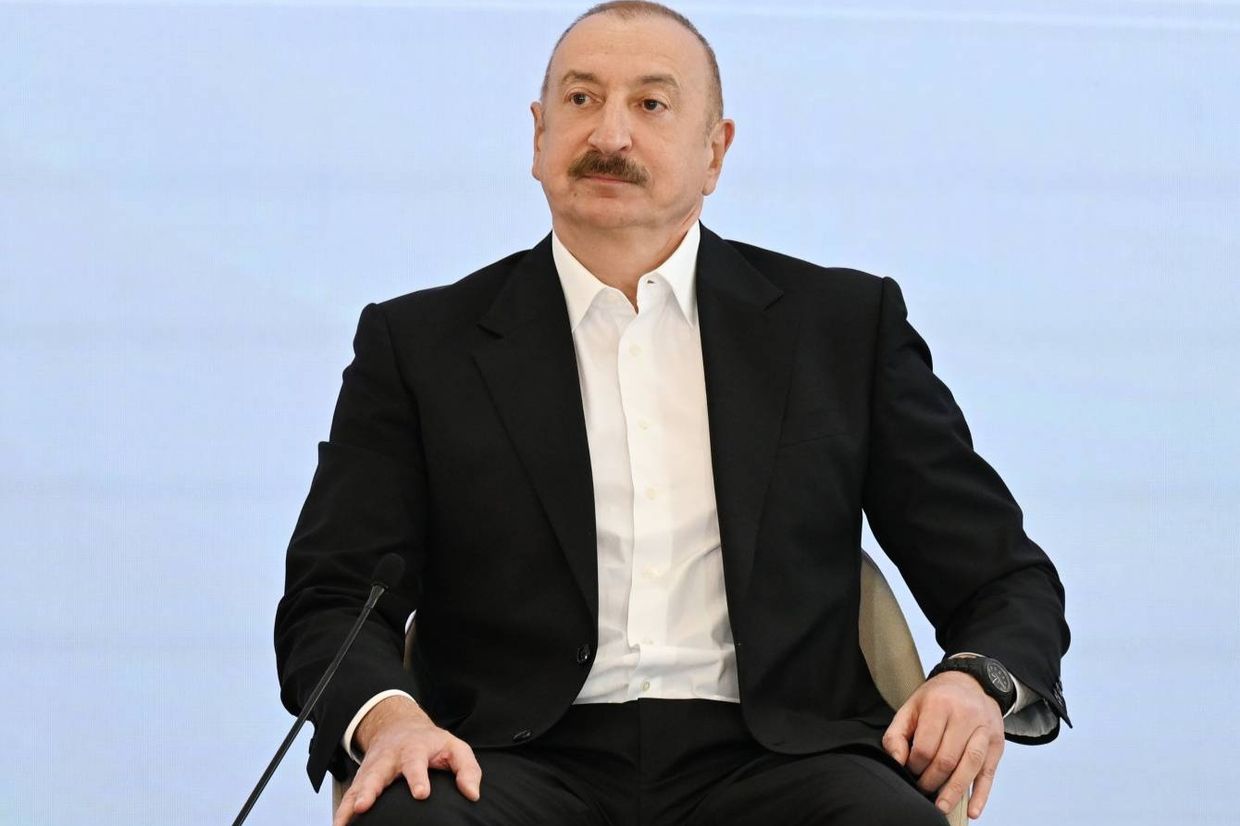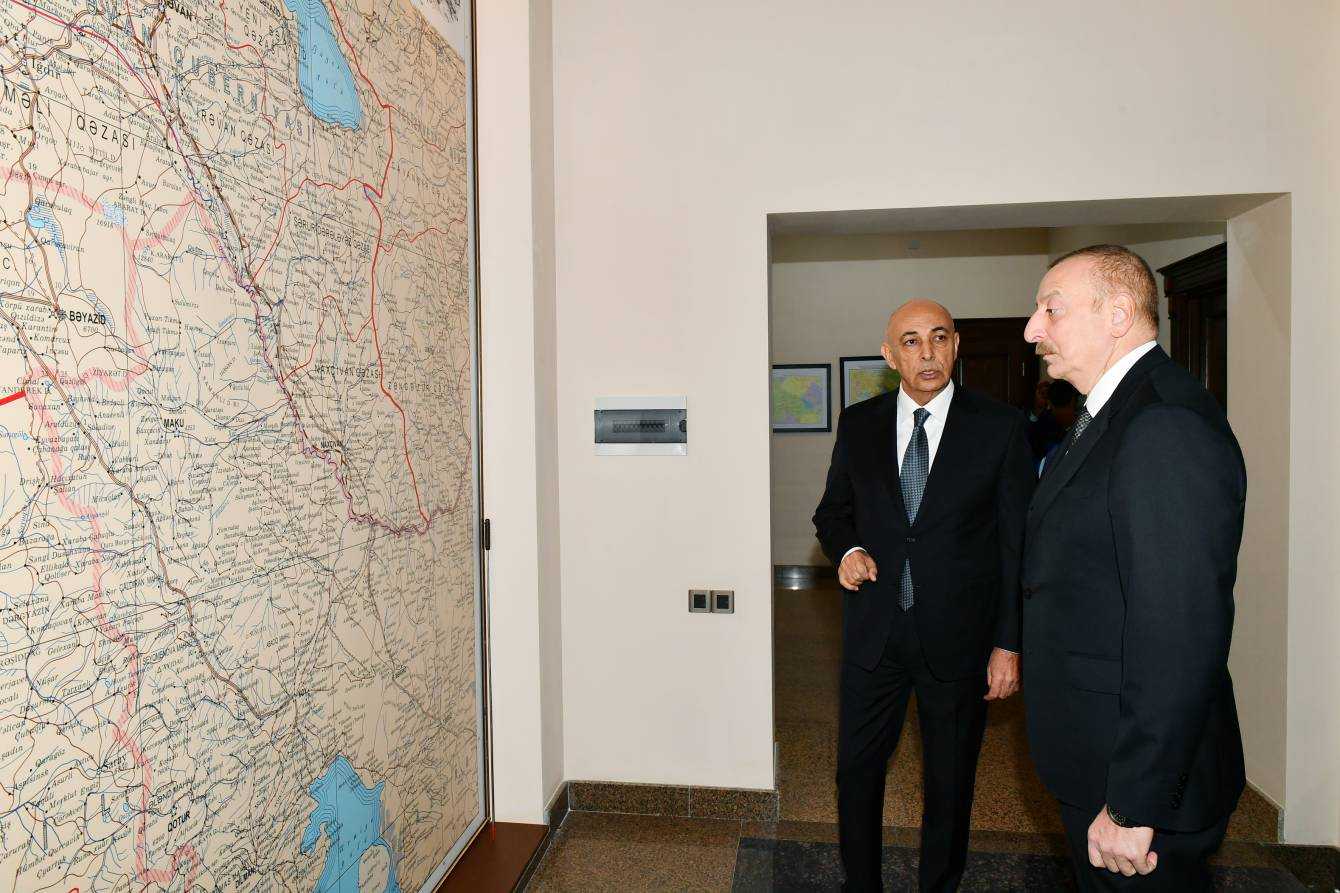Trump says US ‘worked magic’ in Armenia–Azerbaijan peace talks, as debate over corridor continues

US President Donald Trump has said that the US ‘worked magic’ in the peace talks between Armenia and Azerbaijan, saying ‘it’s pretty close if it’s not already done’. It came as Azerbaijani and Armenian officials continue to publicly disagree over how the unblocking of regional transport links could look.
The remark came as part of a speech Trump gave while hosting Republican senators at the White House on 19 July.
Trump has not offered any additional details as to what he was referring to, and neither Armenia nor Azerbaijan have commented on the brief remark.
However, speaking at a media forum in Shusha (Shushi) on the same day, Azerbaijani President Ilham Aliyev was asked about the possibility of a US company overseeing traffic on a potential corridor connecting Azerbaijan with its exclave of Nakhchivan through the territory of Armenia.
In response, he said the question should be directed at the Armenian leadership, but added that ‘no operator, no trader, no lessee can be on our territory’.
On the same day, he also said that he had told Armenian Prime Minister Nikol Pashinyan during their one-on-one peace talks in Abu Dhabi on 10 July that Azerbaijan ‘must have unhindered and safe passage from Azerbaijan to Azerbaijan’.

‘Our cargo and citizens should not see the face of an Armenian border guard there every time. This is our demand. This is a legitimate demand, a fair demand. Otherwise, our citizens will be in danger’, he said.
Aliyev’s statements followed what appeared to be off-hand remarks made by the US Ambassador to Turkey, Tom Barrack, on 12 July.
‘So what happens is America comes in and says: “Okay, we’ll take it over. Give us the 32 kilometres of road on a hundred-year lease, and you can all share it” ’, Barrack said in a vague tone, perhaps as a hypothetical example for a potential solution to an issue that remains a key roadblock in the peace process between Armenia and Azerbaijan.

Later on 16 July, Armenian Prime Minister Nikol Pashinyan confirmed that Yerevan received a US offer for unblocking regional transit links through Armenia. Pashinyan has not specified what routes would be unblocked, but said that Armenia had received various proposals and that ‘any issue is discussed based on the principles of territorial integrity, sovereignty, and jurisdiction of Armenia’.
In a continuation of his remarks on the peace process with Armenia during the forum, Aliyev claimed that Azerbaijan began the peace process, noting that delegations from the OSCE Minsk Group which continued to visit Azerbaijan following the end of the Second Nagorno-Karabakh War of 2020 ‘didn’t know what to do’.
‘I saw that they didn’t know what to do. When they asked me questions, I told them we should work on a peace agreement with Armenia. At that time, the war was over and there was a vacuum. I proposed that a process be started’, he said.
‘We prepared the text of the peace agreement and sent it to Armenia. They had various comments, but for two years there was no progress. The main reason was that Armenia wanted to include the issue of Nagorno-Karabakh in the text of the peace agreement’, he said.
‘We told them: look, first of all, Nagorno-Karabakh exists only in your imagination, it does not exist in reality. This is a part of Azerbaijan and since it is an internal political matter, it cannot be included in the text of the peace treaty. For two years, there was no progress’, he continued.
He also claimed that Armenia was refusing to change its constitution — which Azerbaijan says contains territorial claims against it — or to approve the dissolution of the Minsk Group, which he said was based on Yerevan’s hope that Kamala Harris would win the US presidential election.
‘But as soon as President Trump won, they added those two provisions. I told Pashinyan that you were probably hoping Mrs Harris would win and that you'd be riding in on a white horse — but that didn’t happen. I am completely sure that if Trump hadn’t won, they wouldn’t have agreed to this’, he said.
‘Today, as soon as the constitution and the dissolution of the Minsk Group are resolved — these two issues — the peace agreement can be signed’, he said. ‘The text can be initialed, and it was the Azerbaijani side that proposed this. Initialing does not mean signing. But there is a difference between a verbal agreement and having signatures at the end of each page — that’s what initialing means. I think we are very close’.
He added that he believed the peace process had ‘taken on an irreversible nature’ and could no longer be ‘re-evaluated’.
‘We will not re-negotiate anything. If Armenia tries to start new negotiations again, it means they don’t want peace. Therefore, we are on the right path. They must complete their homework, and if that happens, we can sign the peace agreement’, he said.
‘Armenia cannot be unaware of who entered its territory’
Armenia’s response to Aliyev’s remarks came in a press briefing held by Pashinyan’s spokesperson, Nazeli Baghdasaryan.
During her briefing, Baghdasaryan was asked about her thoughts about Aliyev’s statements regarding Armenian border guards overseeing a road connecting Azerbaijan to Nakhchivan.
‘The Republic of Armenia has never discussed, is not discussing, and will not discuss the terminology and subsequent logic put forth by the Azerbaijani president’, she said, adding that Armenia was discussing the Crossroads of Peace project — an Armenian proposal to unblock transit routes throughout its territory — with ‘both Azerbaijan and other international partners’.
She added that Armenia was ready to ensure transport connection through its territory for Azerbaijan, and that it would ‘take place under the principles of full adherence to the two countries' territorial integrity, sovereignty, jurisdiction and reciprocity’.
Baghdasaryan called Aliyev’s statements saying that Azerbaijanis should not see Armenian border guards ‘beyond the logic of the discussions that took place’ and ‘basically a concealed territorial claim against’ Armenia.
She referred to Pashinyan’s 16 July press conference, where he said that goods or people entering Armenia, including in transit, are subject to mandatory customs and border control — lest an ‘uncontrollable source of smuggling and trafficking could emerge’.
‘The Republic of Armenia cannot be unaware of who entered its territory and whether or not they left afterward’, she said.
Baghdasaryan also noted that during the same press conference, Pashinyan suggested that contacts between Armenia and Azerbaijan could be carried out ‘sometimes without any contact, with biometric passports and online goods declaration and scanning’.
‘In all cases the respective agreed-upon fees must be paid, and the state budget of the Republic of Armenia shall receive revenue from the relaunch of the transport connections’, she said.
She also said that Azerbaijan ‘has been either ignoring or rejecting’ Armenia’s offers to unblock transit routes between them. This was in response to a question she had received about Armenia’s readiness to build a railway to facilitate transit between Azerbaijan’s western regions and Nakhchivan, in light of statements made by Aliyev saying that Azerbaijan was about to finish constructing its own railways for the same purpose.
‘Regarding the construction of the railway, the railway which is under construction in Azerbaijan has also domestic significance (it links Baku with Azerbaijan’s western regions)’, she said, according to Armenpress.
She added that Armenia would construct a 42 kilometre-long railway in its southern Syunik province ‘only in the case of agreement with Azerbaijan’. She noted that preparatory work ‘is already underway’ on constructing new roads.
Baghdasaryan noted that ‘discussions are now underway’ on how the Minsk Group could be dissolved, but said that Pashinyan said that he would ‘personally initiate constitutional changes in Armenia if the Constitutional Court were to deem the peace agreement as contradicting the constitution after its signing’.
‘There is no reason for it before that, because the Constitutional Court of Armenia, with its September 2024 decision, ruled that our constitution does not contain any territorial claims against any country’, she said.











